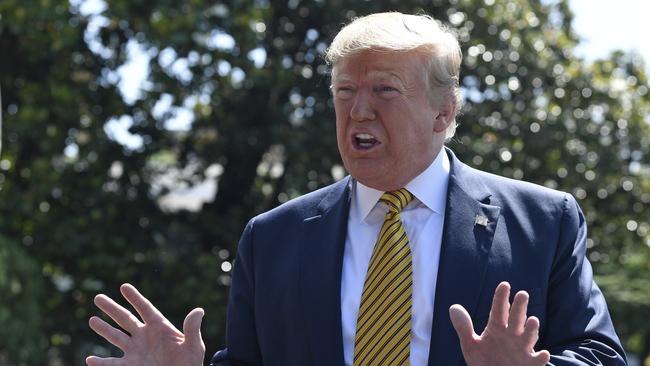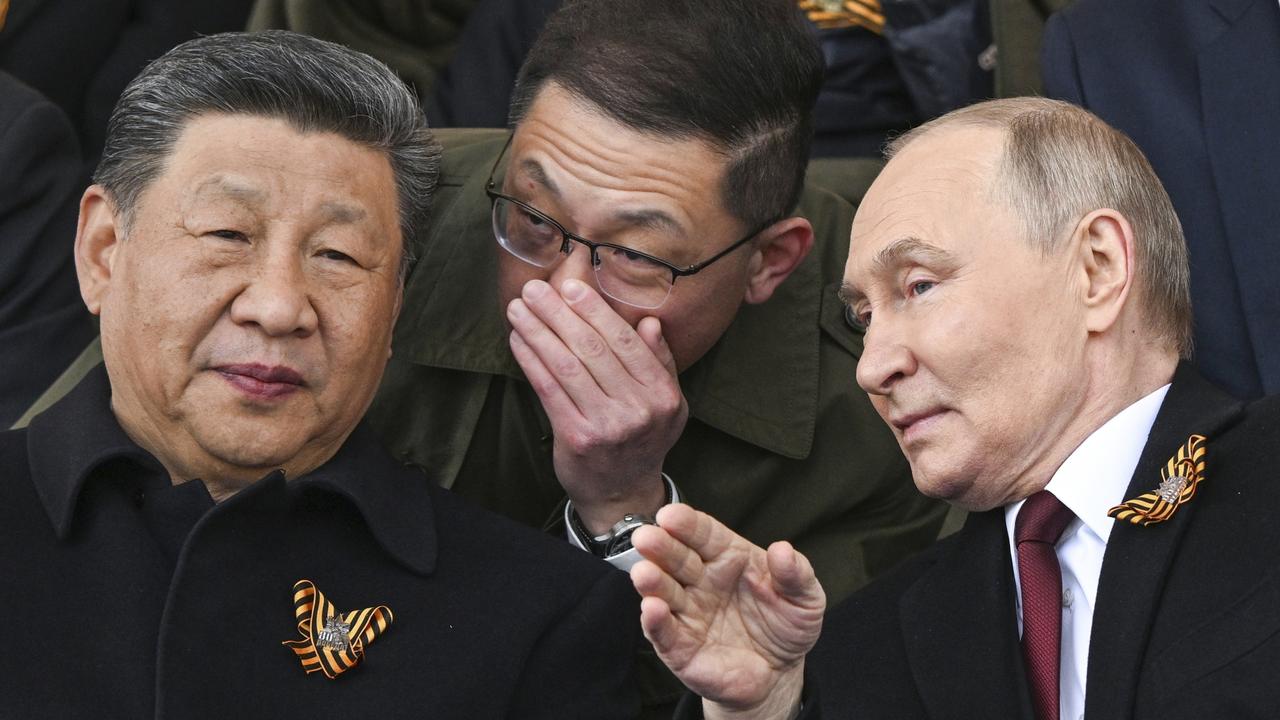Donald Trump bucked national security aides on proposed Iran attack
Donald Trump bucked his security advisers by abandoning strikes; opts for new sanctions.

US President Donald Trump bucked most of his top national-security advisers by abandoning retaliatory strikes in Iran on Thursday. In private conversations on Friday, Mr Trump revelled in his judgment, certain about his decision to call off the attacks while speaking of his administration as if removed from the centre of it.
“These people want to push us into a war, and it’s so disgusting,” Mr. Trump told one confidante about his own inner circle of advisers. “We don’t need any more wars.” In these conversations, Mr Trump bemoaned the costs of a drone shot down by Iran — about $130 million before research and development — but told people the dollar figure would resonate less with US voters than the potential casualties. The president has said estimates provided to him showed as many as 150 people could have been killed. He noted to confidantes that each one of those Iranians had families, which would mean that hundreds more would be affected.
“I don’t want to kill 150 Iranians,” he told reporters on Saturday, adding that he has Iranian friends back home in New York. “I don’t want to kill 150 of anything or anybody, unless it’s absolutely necessary.” On Saturday, Mr Trump backed a new course of action: another round of sanctions on Tehran to be formally announced on Monday, though he didn’t offer any additional detail. The administration’s current package of sanctions against Iran has pushed the country’s economy into a multiyear contraction and increased tensions in the region. But the measures have yet to persuade Tehran to open negotiations with Mr Trump, who is seeking an agreement to curb Iran’s nuclear ambitions.
While many of Mr Trump’s top advisers backed a more aggressive set of strike options, Marine General Joe Dunford, chairman of the Joint Chiefs of Staff, struck a more wary note, which had an outsize influence on the president.
Mr Trump himself on Saturday publicly described the conflict within his own team that remained a sore spot for some involved. He praised General Dunford for counselling caution, while singling out his past disagreements with his hawkish national-security adviser John Bolton, who was the driving force behind the proposed strikes.
Mr Trump described General Dunford, who officials said has developed a personal rapport with the president, as a “terrific man and a terrific general.” He raised Mr Bolton’s support for the Iraq war during President George W. Bush’s administration, saying it was a big mistake.
“John Bolton is doing a good job, but he takes generally a tough posture, ” Mr Trump told reporters at the White House. “The only one that matters is me.” The president is known for seeking a range of opinions, and he did that again amid rising tensions with Iran, even reaching out to Fox News host Tucker Carlson, according to people familiar with those conversations. Mr Carlson has opposed military intervention in Iran on his prime-time television show.
Mr Trump said he wants a certain amount of division within his team as he makes a decision, and suggested he was proud about how that reflected on him.
“Everybody was saying I’m a warmonger, and now they’re saying I’m a dove, ” Mr Trump told reporters at the White House. “And I’m neither, if you want to know the truth. I’m a man with common sense.” But members of Mr Trump’s team weren’t as pleased with the president about the internal schism, which appeared to strain the fragile alliance within this group at yet another period of transition, according to administration officials. It was unclear whether the division within the team — which includes Mr Trump’s third national-security adviser, second secretary of state and third official in charge of the Defence Department — would heal or continue to fester.
As an illustration of the behind-the-scenes squabbling Saturday, one administration official said the Pentagon thwarted agreed-upon plans in Iran by using backchannels to provide Mr Trump with inaccurate estimates of casualties. This official said a Pentagon attorney sent the estimate to the White House Counsel’s Office, which gave it to the president.
But another administration official dismissed the accusations as sour grapes. One official said the number of 150 casualties was generated at the White House, not the Pentagon, which routinely uses a “collateral damage assessment” of its own with any significant military operation. But the military’s range of options didn’t include a number that high, two officials said.
Spokesmen for the White House and Pentagon declined to comment. “As senior military adviser to the president, General Dunford did provide his military advice on Iran,” said Colonel Pat Ryder, a spokesman for General Dunford. “However, I have nothing further to provide in regards to President Trump’s comments. As a matter of policy, we do not discuss deliberations.” Mr Trump, for his part, acknowledged that the estimate came from attorneys, but ultimately was delivered to him by a general. Asked whether it was General Dunford, the Pentagon’s top military officer, President Trump declined to say directly, responding: “I had a long talk with Dunford. He’s a great gentleman.” The attack on a US drone was just the latest in a series of provocative actions from Tehran and prompted a national-security team meeting Thursday morning — a breakfast in the White House — at Mr Bolton’s request.
The breakfast is a weekly meeting for Mr Bolton, Secretary of State Mike Pompeo and acting Defence Secretary Patrick Shanahan. On Thursday, it also included General Dunford, who officials said has emerged as an influential voice inside the Pentagon, and Mike Esper, whom Mr Trump has said he will nominate to replace Mr Shanahan atop the Defence Department.
A response to Iran dominated the discussion and, according to many officials, a unanimous agreement was reached to recommend military action. That recommendation included strikes against a few Iranian targets, according to a person familiar with the planning.
But General Dunford, who cancelled a trip to Afghanistan scheduled for Saturday as tensions with Iran escalated, rarely provides such specific advice, and didn’t at the Thursday breakfast, according to many officials familiar with the planning. General Dunford typically offers a straight analysis of each option, making clear the costs without weighting one option over the other, these people said.
Military officials have long said they don’t seek a conflict with Iran. They were concerned about casualties and about ensuring any strike option was proportional, but they also worried about an Iranian response. The US military’s presence in the region has been reduced over the years and no one wanted to stumble into a conflict with the military operating with reduced capabilities, a number of officials said.
Mr Pompeo was supportive of strikes at the breakfast, but also more understanding of the reluctance that others perceived coming from the Defence Department, administration and White House officials. Vice President Mike Pence supported the strikes in a national-security meeting later that morning, then supported the president’s decision to halt them, according to these officials.
At that national-security meeting, the recommended option was presented to the president, officials said. Casualties were discussed and the president agreed to the plan, one official said. “The president acknowledged there may be casualties. Full stop,” the official said.
On Saturday, Mr Trump said his team had brought him “a great plan,” but added that the casualty estimate was imprecise. He made clear that no final approval would be given until later.
“They gave me very odd numbers,” Mr Trump said about his national-security team. “I wanted an accurate count.” That estimate came later on Thursday: 150 potential casualties, or about 40 to 50 at each strike, Mr Trump explained on Saturday.
But one administration official disputed that estimate, saying it was a worst-case scenario for a strike that happened in the middle of the day. The strikes were planned for the middle of the night, when there would have been a few casualties at each location, the official said.
That still may have been too many for Mr Trump. “Anything is a lot when you shoot down an unmanned” drone, the president said Saturday, when asked about the casualty estimates.
The Wall Street Journal



To join the conversation, please log in. Don't have an account? Register
Join the conversation, you are commenting as Logout